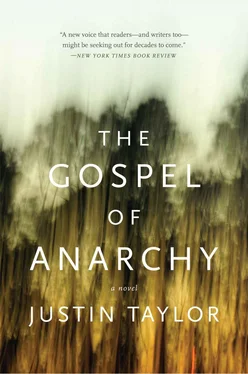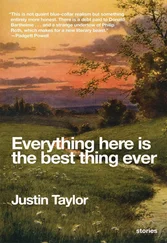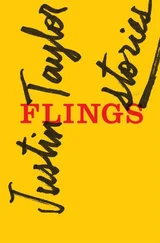I liked taking Archer because it hooks back around the south side of campus, past the Beaty Towers, and meets up with Thirteenth Street, one of the border roads of the student ghetto, which I could take nearly all the way home. Or, if I took Thirteenth the other way, I could ride out to Paynes Prairie, the so-called Alachua Savannah, where you could glimpse horse herds and buffalo at sunrise and evening, and the walking trails were dotted with signs warning of wild boar. It was to this prehistoric place that Parker had fled, like John the Baptist in the wilderness, I imagined. I could see him out there, how his presence was like a bolt of pure spirit-lightning streaking through the sweep of God’s untroubled creation, how scope is its own wisdom, how truth is the only thing that lasts.
But I saw construction sites also. Not on the prairie, of course — which was a protected nature preserve — but on the long road leading to it, as well as all throughout town. More and more always, single-family homes demolished, stands of trees cut down. They were making way for apartment complexes like the one I had lived in. Everywhere I went I saw the cancer, the devastation, as Parker himself had seen it, and my heart was sick to look upon these things, and I wanted to somehow get involved, not stand apart and watch. But what would I do? Join some group? Write a letter? Paint a sign and hold it up? Let the dead bury the dead , I thought. Let the world solve the problem of the world .
Our house became a beacon, even as the other houses on our block were emptied out, went dark. Consolidated Properties was moving in like the land sharks they were, but our man Stuckins stuck fast, and our autonomous zone was safe and we were safe inside it; indeed we were flourishing, a desert orchid in flower, as up and down the block buyout prices were reached, and the street became such a ghost town there might as well have been tumbleweeds.
There was nobody left to call in noise complaints on us and we rejoiced in the awesome power of the Lord.
Word spread of us, rumors of what we preached and who we were. People wanted to see and to know. We were sought out. Our travelers’ rest was full now, and Thomas’s old room, which had become another one, was, too. We were a hostel, sort of, but that was only the beginning of what we were. There were a dozen people living at Fishgut — auspicious number! — and numbers untold passing through and dropping in. It was not unusual at any given hour to see one or a few punks in contemplative silence or loud slurred professions of devotion about Parker’s shrine. Services ran every Sunday night now and were followed by staple-and-fold sessions. Copies of the Good Zine were stacked up in piles, slipped into newspaper machines, stuffed into the backpacks of our departing guests. They left with as many as we could copy, as many as they had space to take. All bound for distribution — anywhere, everywhere, wherever. Our book was dandelion fluff; windborne spore. Our devotion was repaid a thousandfold. People brought us or sent us all kinds of things we never asked for: money, gifts, whatever they had. We always had more than we needed, and gave as much as we could of it away again — to our congregants, the local homeless, curious college kids who happened by. We were a small blazing light in the distance on a darkling plain. We were a mystery cult, attuned to the necessity of eternal pursuit, perpetual perfecting, and the violent, transformative Grace of our lawless God.
Winning converts. Like the door guy at Clasen’s, Shrike was his name; a veteran scenester who did tattoos. We could get into shows for free now, and he brought his equipment over on Sunday nights when he wasn’t working, and during the reveries that followed our services he offered up Parker’s Mark at ink cost to anyone who felt themselves ready. The labor itself he gave out of love. I took a big swig of something clear that burned my throat, handed the bottle off to someone, and got in Shrike’s line. He was sitting on a small stool he’d brought. I sat in Katy’s favorite chair.
I am a book, I remember thinking, as the needle seethed over my flesh — my teeth clenched and Lord give me strength my eyes shut tightly and trying not to jerk away or wince too much— I am a book and this is my inscription. I am dedicated now and for all time.
We circled round the hate-breathing evangelists who haunted Turlington Plaza, a large outdoor gathering place on campus, who shouted about hellfire and chastity and faggots and otherwise made a brutal spectacle of their miscarriage of God’s love. They stood in the lumpy shadow of a great gray-brown abstract sculpture that everyone called the Potato. It was ringed by wooden benches and you weren’t supposed to climb it, but you could, and some of us did, while others gathered close, cinching the preachers in our snare — whoever it was on that day, whichever denomination, the exact ones changed. A Baptist sweating through a cheap suit, a Chinese Adventist in an ankle-length dress with long sleeves, a suited-up Witness with an armload of pamphlets not so different, in the end, from our own. Being wrongly dressed for the weather seemed essential to all of their programs. From wherever we were — up above him, all around her — we raised our voices and preached back, louder: the good gospel of anarchy in a raucous eruption of joyful noise. There we were, Legion-like, earnest and bonkers in torn tee shirts and paint-spattered shorts, louder and more interesting than whatever it was we were disrupting, a source of endless envy and nuisance to the straitjacketed, sad-eyed world.
At night, in the rooftop pool of the hotel across from campus, doing cannonballs or diving down and hugging bottom till our chests burned, thinking The body is the site of all experience in this world, swimming up against some other body, Now we see each other face to face , a hand reaching for the slippery neck of a bottle, Joy is a better form of prayer than prayer, playing chicken or running where you weren’t supposed to, bright flashes of pale flesh in moonlight — see we weren’t always serious, and knew how to have fun like kids do, like everyone should, like humans were made and meant to: exultant, dirty innocence; hellbent pleasure; Zerowork. The biggest, hairiest kids you ever saw.
We spread out across town — paired off or by our lonesomes or in freewheeling squads — to open dumpsters and the unalarmed back doors of stores. We barely distinguished between products and trash any longer — there was only what we needed or wanted or could get. If it was available, our opinion of its worth was no longer a relevant consideration, or, better put: availability itself was a strange attractor and bestowed value, Midas-like, on all that it touched.
When the thefts, scroungings, and donations yielded more than we knew what to do with — four toasters, ten lamps! — we held yard “sales,” great giveaways, where everything was free. We stapled fliers to utility poles and filled our front yard up with stuff. Little old lady bargain seekers turned dumpstered serving plates upside down in the vain search for a price tag. “Just take it,” we said. “It’s yours.” A deal, and they would have been happy. But free? They only stared at us, lips pursed in grim suspicion, both hands clutching the pocketbook, looking us up and down. “I’ll have to think about it,” they said, and walked away; wary glances back over slumped shoulders — what did we care? We had done our best by them. Anything we couldn’t get rid of we gleefully destroyed, and made raw materials of the gleaming rubble — splintered wood and glass chips, perfect for bricolage, for conceptual sculpture! Whatever anyone wanted or could dream up, and this is not to suggest that the generative acts of destruction weren’t regarded as artistic expressions in and of themselves.
Читать дальше












